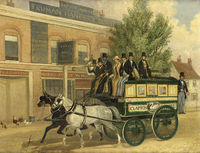Annotation:Omnibus (The): Difference between revisions
No edit summary |
m (Text replacement - "garamond, serif" to "sans-serif") |
||
| (5 intermediate revisions by one other user not shown) | |||
| Line 1: | Line 1: | ||
=='''Back to [[{{BASEPAGENAME}}]]'''== | =='''Back to [[{{BASEPAGENAME}}]]'''== | ||
---- | ---- | ||
<p><font face=" | <p><font face="sans-serif" size="4"> | ||
'''OMNIBUS, THE.''' AKA and see "[[Kielder Jock's]]," "[[ | '''OMNIBUS, THE.''' AKA and see "[[Kielder Jock's]]," "[[Merrymaker's Club]]," "[[Norfolk Hornpipe (2) (The)]]," "[[Stage Hornpipe (1)]]." English, Hornpipe. England, Northumberland. G Major. Standard tuning (fiddle). AABB. One of the more famous compositions of Tyneside publican, fiddler and composer James Hill (c. 1811-1853). Francis O'Neill gives it as "[[Merrymaker's Club]]" in his '''Music of Ireland''' (1903). The "[[Kielder Jock]]" title honors Jack "Kielder Jock" Davidson, a Northumbrian fiddler from the late 1800’s. Famed County Sligo fiddler Michael Coleman recorded the tune as "The Stage." | ||
[[File:omnibus.jpg|200px|thumb|left|A London omnibus, c. 1850.]] | |||
An 'omnibus' or horse-bus [http://en.wikipedia.org/wiki/Horsebus] was a large horse-drawn enclosed carriage, with seating both inside and outside. It was a popular means of transportation in 19th century cities, with the first London line opening in 1829, although the first line in England was located in the city of Manchester, and predated the larger city by five years. In James Hill's locale, omnibuses were first established to run between Newcastle and Tynemouth in May, 1833, which perhaps helps to date the tune. | |||
<br> | <br> | ||
<br> | <br> | ||
</font></p> | </font></p> | ||
<p><font face=" | <p><font face="sans-serif" size="4"> | ||
''Source for notated version'': | ''Source for notated version'': | ||
<br> | <br> | ||
<br> | <br> | ||
</font></p> | </font></p> | ||
<p><font face=" | <p><font face="sans-serif" size="4"> | ||
''Printed sources'': Dixon ('''The Lads Like Beer'''), 1987. Miller ('''Fiddler's Throne'''), 2004; No. 303, p. 179. Northumbrian Pipers' Society ('''The Fiddle Music of James Hill'''), 2005. | ''Printed sources'': Dixon ('''The Lads Like Beer'''), 1987. Miller ('''Fiddler's Throne'''), 2004; No. 303, p. 179. Northumbrian Pipers' Society ('''The Fiddle Music of James Hill'''), 2005. | ||
<br> | <br> | ||
<br> | <br> | ||
</font></p> | </font></p> | ||
<p><font face=" | <p><font face="sans-serif" size="4"> | ||
''Recorded sources'': <font color=teal></font> | ''Recorded sources'': <font color=teal></font> | ||
</font></p> | </font></p> | ||
Latest revision as of 14:31, 6 May 2019
Back to Omnibus (The)
OMNIBUS, THE. AKA and see "Kielder Jock's," "Merrymaker's Club," "Norfolk Hornpipe (2) (The)," "Stage Hornpipe (1)." English, Hornpipe. England, Northumberland. G Major. Standard tuning (fiddle). AABB. One of the more famous compositions of Tyneside publican, fiddler and composer James Hill (c. 1811-1853). Francis O'Neill gives it as "Merrymaker's Club" in his Music of Ireland (1903). The "Kielder Jock" title honors Jack "Kielder Jock" Davidson, a Northumbrian fiddler from the late 1800’s. Famed County Sligo fiddler Michael Coleman recorded the tune as "The Stage."

An 'omnibus' or horse-bus [1] was a large horse-drawn enclosed carriage, with seating both inside and outside. It was a popular means of transportation in 19th century cities, with the first London line opening in 1829, although the first line in England was located in the city of Manchester, and predated the larger city by five years. In James Hill's locale, omnibuses were first established to run between Newcastle and Tynemouth in May, 1833, which perhaps helps to date the tune.
Source for notated version:
Printed sources: Dixon (The Lads Like Beer), 1987. Miller (Fiddler's Throne), 2004; No. 303, p. 179. Northumbrian Pipers' Society (The Fiddle Music of James Hill), 2005.
Recorded sources:
